Review Committee
The Américas Award is awarded based on the input of the Américas Award Review Committee, the members of which serve three-year terms.
Vicky Lowe (2022–2025)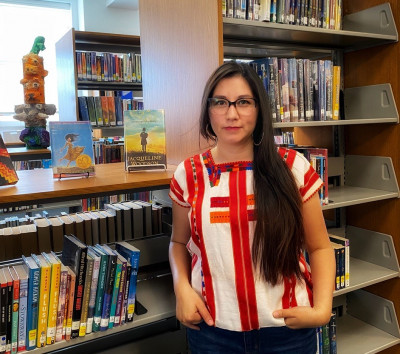 Vicky Lowe currently teaches Spanish and Art at the Madeleine Choir School where she is the head of the Spanish department and Heritage Spanish program. She has taught K-8 for seventeen years. Her degrees are in Spanish teaching and Latin American Studies, and a Masters in Advanced Studies of Hispanic and Latin-American Literature. Her interest in teaching is rooted in her desire to guide a deep exploration of Latin American history, languages and cultures, including the understanding of indigenous perspectives and experiences. Vicky also collaborates with multiple organizations in Salt Lake City, Utah, including the Museum of Natural History, Arte de Mexico en Utah, Wasatch Community Gardens and PBS Utah, to develop curriculum, workshops and conversations with the community around indigenous knowledge and practices. Vicky’s life and work is directly influenced by her personal history. As the daughter of a Tseltal Maya indigenous mother and a caucasian archaeologist father, she has experienced various aspects of living and ancient Maya traditions. Witnessing the Zapatista uprising in her native Chiapas, Mexico, made her uniquely aware of the disparities and inequalities that indigenous people suffer, including her own family. Driven by her experience as an immigrant in the United States, she also aims to make visible, celebrate, and recognize the diverse identities of immigrant populations through her teaching. For Vicky, books help her understand and connect with her students and the world around her. Books are a portal to new adventures; sometimes she sees herself reflected on the characters and sometimes they are windows to see life through someone else’s history. Vicky is also a visual artist, loves good music, and spending time with her loved ones.
Vicky Lowe currently teaches Spanish and Art at the Madeleine Choir School where she is the head of the Spanish department and Heritage Spanish program. She has taught K-8 for seventeen years. Her degrees are in Spanish teaching and Latin American Studies, and a Masters in Advanced Studies of Hispanic and Latin-American Literature. Her interest in teaching is rooted in her desire to guide a deep exploration of Latin American history, languages and cultures, including the understanding of indigenous perspectives and experiences. Vicky also collaborates with multiple organizations in Salt Lake City, Utah, including the Museum of Natural History, Arte de Mexico en Utah, Wasatch Community Gardens and PBS Utah, to develop curriculum, workshops and conversations with the community around indigenous knowledge and practices. Vicky’s life and work is directly influenced by her personal history. As the daughter of a Tseltal Maya indigenous mother and a caucasian archaeologist father, she has experienced various aspects of living and ancient Maya traditions. Witnessing the Zapatista uprising in her native Chiapas, Mexico, made her uniquely aware of the disparities and inequalities that indigenous people suffer, including her own family. Driven by her experience as an immigrant in the United States, she also aims to make visible, celebrate, and recognize the diverse identities of immigrant populations through her teaching. For Vicky, books help her understand and connect with her students and the world around her. Books are a portal to new adventures; sometimes she sees herself reflected on the characters and sometimes they are windows to see life through someone else’s history. Vicky is also a visual artist, loves good music, and spending time with her loved ones.
Cristina Rhodes (2022–2025)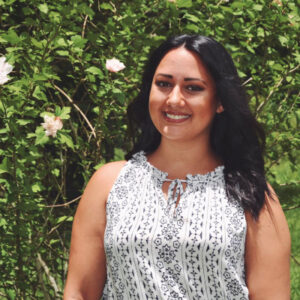 Dr. Cristina Rhodes is an assistant professor of multi-ethnic American literature at Shippensburg University of Pennsylvania. She has published multiple academic articles on Latinx children’s literature, particularly thinking about how the Latinx youth body engages in changing the world. In addition to her scholarly writing, she is a regular contributor to Latinxs in Kid Lit, publishing reviews and original articles for teachers, librarians, and other consumers. She is also the book review co-editor for the academic journal Research on Diversity in Youth Literature. Dr. Rhodes’s passion for Latinx children’s literature stems from the desire to ensure that other Latinx children, unlike herself, are able to see their realities represented in the books they read when they are still young.
Dr. Cristina Rhodes is an assistant professor of multi-ethnic American literature at Shippensburg University of Pennsylvania. She has published multiple academic articles on Latinx children’s literature, particularly thinking about how the Latinx youth body engages in changing the world. In addition to her scholarly writing, she is a regular contributor to Latinxs in Kid Lit, publishing reviews and original articles for teachers, librarians, and other consumers. She is also the book review co-editor for the academic journal Research on Diversity in Youth Literature. Dr. Rhodes’s passion for Latinx children’s literature stems from the desire to ensure that other Latinx children, unlike herself, are able to see their realities represented in the books they read when they are still young.
Sergio Vasquez (2023-2025)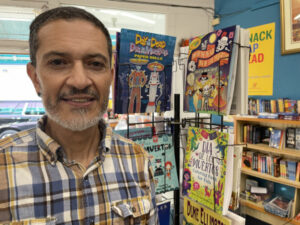 Born in Tlaquepaque, Jalisco, México, Sergio moved to the United States at the age of 5. He currently works at Tulane University’s Center for Public Service where he helps manage the Service-Learning co-requisites, including, among others, the Latin American Studies courses. He previously spent nearly 20 years in the San Francisco Bay Area, 14 of those years in secondary education, where he helped establish the first all-boys’ high school in the Sacred Heart tradition, a tradition established by a religious congregation of women. Before Tulane, Sergio helped run Duchesne House for Volunteers, a ministry of the Society of the Sacred Heart, and has led workshops on the educational mission of the Society of the Sacred Heart on 5 continents. He values cultural diversity and inclusion as an educational model. As an immigrant, Sergio found himself drawn to books and reading at a very early age: learning, and discovering about life, society, and culture. His role in Tulane’s Center for Public service allows him to stay connected with former Bayou Road neighbors like Community Book Center, where he shares the Community Book Center’s work of close to 40 years celebrating authors and literary icons, locally and internationally.
Born in Tlaquepaque, Jalisco, México, Sergio moved to the United States at the age of 5. He currently works at Tulane University’s Center for Public Service where he helps manage the Service-Learning co-requisites, including, among others, the Latin American Studies courses. He previously spent nearly 20 years in the San Francisco Bay Area, 14 of those years in secondary education, where he helped establish the first all-boys’ high school in the Sacred Heart tradition, a tradition established by a religious congregation of women. Before Tulane, Sergio helped run Duchesne House for Volunteers, a ministry of the Society of the Sacred Heart, and has led workshops on the educational mission of the Society of the Sacred Heart on 5 continents. He values cultural diversity and inclusion as an educational model. As an immigrant, Sergio found himself drawn to books and reading at a very early age: learning, and discovering about life, society, and culture. His role in Tulane’s Center for Public service allows him to stay connected with former Bayou Road neighbors like Community Book Center, where he shares the Community Book Center’s work of close to 40 years celebrating authors and literary icons, locally and internationally.
Hassael Cazesuz (2024-2026)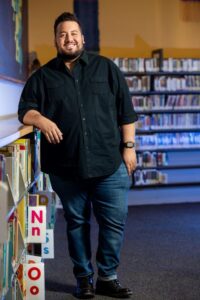 Hassael Cazesuz is a first-generation Chicano residing in Tucson, Arizona. He was born in Anaheim, California but has lived in the “Old Pueblo” for the majority of his life. He is an Arizona State University and the University of Arizona alum and does not partake in school rivalries. For the duration of his graduate academic career at the University of Arizona, Hassael was a Knowledge River Scholar. The Knowledge River program recognizes and supports information professionals interested in librarianship, with a focus on furthering their understanding of the disparities in underserved BIPOC communities, and how to utilize the acquired academic tools to better serve them. Hassael is a Librarian who has had the privilege to work at the Pima County Public Library for 15 years and counting. Currently, Hassael helms the Latinx Program Manger position at PCPL. In this role, Hassael is able to fuel his passion for serving the Latinx, Chicanx, Mexican-American and Spanish-Speaking communities in Pima County through continued advocacy for equal and equitable access to information, resources and library services. Fortunately, he has the opportunity to share this work with PCPL’s affinity group called Nuestras Raíces, that has had a lasting heritage impact in Pima County. Alongside his colleagues who have become life-long friends, Hassael is able to apply cultural competency and humility when coordinating programming and creating crucial connections with the Latinx and Spanish Speaking community. One of the most gratifying aspects of Hassael’s career is his participation in the Tucson Festival of Books where he assists with coordination in identifying and inviting Latinx and Indigenous authors within the Nuestras Raíces tent, the only exclusive venue dedicated to Latinx and Indigenous authors, to amplify Latinx and Indigenous voices and connect the community with their art.
Hassael Cazesuz is a first-generation Chicano residing in Tucson, Arizona. He was born in Anaheim, California but has lived in the “Old Pueblo” for the majority of his life. He is an Arizona State University and the University of Arizona alum and does not partake in school rivalries. For the duration of his graduate academic career at the University of Arizona, Hassael was a Knowledge River Scholar. The Knowledge River program recognizes and supports information professionals interested in librarianship, with a focus on furthering their understanding of the disparities in underserved BIPOC communities, and how to utilize the acquired academic tools to better serve them. Hassael is a Librarian who has had the privilege to work at the Pima County Public Library for 15 years and counting. Currently, Hassael helms the Latinx Program Manger position at PCPL. In this role, Hassael is able to fuel his passion for serving the Latinx, Chicanx, Mexican-American and Spanish-Speaking communities in Pima County through continued advocacy for equal and equitable access to information, resources and library services. Fortunately, he has the opportunity to share this work with PCPL’s affinity group called Nuestras Raíces, that has had a lasting heritage impact in Pima County. Alongside his colleagues who have become life-long friends, Hassael is able to apply cultural competency and humility when coordinating programming and creating crucial connections with the Latinx and Spanish Speaking community. One of the most gratifying aspects of Hassael’s career is his participation in the Tucson Festival of Books where he assists with coordination in identifying and inviting Latinx and Indigenous authors within the Nuestras Raíces tent, the only exclusive venue dedicated to Latinx and Indigenous authors, to amplify Latinx and Indigenous voices and connect the community with their art.
Shane Carter (2024-2026)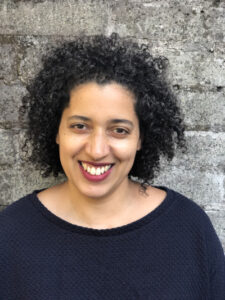 Shane Carter is the Program Coordinator for ORIAS (the Office of Resources for International and Area Studies) at the University of California, Berkeley. ORIAS offers educator resources and workshops focused on World History and other international topics on behalf of several area studies centers, including the Center for Latin American Studies. Prior to working for ORIAS, Shane spent two decades as a high school history-social studies teacher.
Shane Carter is the Program Coordinator for ORIAS (the Office of Resources for International and Area Studies) at the University of California, Berkeley. ORIAS offers educator resources and workshops focused on World History and other international topics on behalf of several area studies centers, including the Center for Latin American Studies. Prior to working for ORIAS, Shane spent two decades as a high school history-social studies teacher.
Julia Byrd (2025-2027)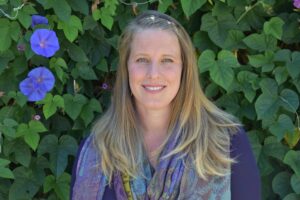 Julia Byrd is the Vice Chair at the Center for Latin American and Caribbean Studies (CLACS) at the University of California, Berkeley. She has decades of experience in philanthropy and educational programs in the U.S. and in Latin America, working with U.S. universities and community-based non-profit organizations. At CLACS, she manages and develops grant and endowment programs; administers student fellowships; and oversees programs, staff and daily operations. She oversees CLACS outreach efforts, partnering with units across campus and the United States. She created the Nahuatl and Mam language programs at Berkeley in collaboration with community groups to serve Berkeley students and the broader Bay Area. Julia has degrees from Wesleyan University and Stanford University in Latin American Studies. She is also a parent of two children in elementary school and spends hours every day reading children’s literature.
Julia Byrd is the Vice Chair at the Center for Latin American and Caribbean Studies (CLACS) at the University of California, Berkeley. She has decades of experience in philanthropy and educational programs in the U.S. and in Latin America, working with U.S. universities and community-based non-profit organizations. At CLACS, she manages and develops grant and endowment programs; administers student fellowships; and oversees programs, staff and daily operations. She oversees CLACS outreach efforts, partnering with units across campus and the United States. She created the Nahuatl and Mam language programs at Berkeley in collaboration with community groups to serve Berkeley students and the broader Bay Area. Julia has degrees from Wesleyan University and Stanford University in Latin American Studies. She is also a parent of two children in elementary school and spends hours every day reading children’s literature.
Abigail Chase (2025-2027)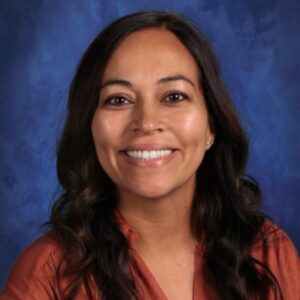
Miriam Villanueva (2025-2027)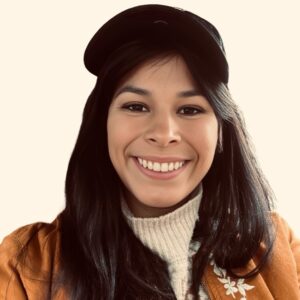 Dr. Miriam Elizabeth Villanueva (She/Ella) is a Chicana, Fronteriza from the South Texas border and a historian of modern Latin American history, primarily in nineteenth and twentieth century Central American history. She received her Ph.D. from Texas Christian University (2017) with a dual emphasis on cultural studies and borderland theory. She has published in the Journal of South Texas and the edited book, Latin America and the Global Cold War. Her work discusses how Panama’s anti-imperialist military government tapped into rising Third Worldism on the streets during the 1970s. Analyzing General Omar Torrijos’ multilayered struggle to liberate his country’s Canal Zone from U.S. occupation, Villanueva uncovers the Panamanian military’s strategic alliance with anti-colonial social movements. Successfully employing Third World cultural theory to reimagine Panama’s decades-long struggle for canal sovereignty, the military’s coalition with artists and students won domestic and foreign legitimacy amid rising anti-imperialist sentiment throughout the Global South. Villanueva is completing her manuscript, Reclaiming a Homeland: Power, Liberation, and Third Worldism in Panama, 1968-1983.
Dr. Miriam Elizabeth Villanueva (She/Ella) is a Chicana, Fronteriza from the South Texas border and a historian of modern Latin American history, primarily in nineteenth and twentieth century Central American history. She received her Ph.D. from Texas Christian University (2017) with a dual emphasis on cultural studies and borderland theory. She has published in the Journal of South Texas and the edited book, Latin America and the Global Cold War. Her work discusses how Panama’s anti-imperialist military government tapped into rising Third Worldism on the streets during the 1970s. Analyzing General Omar Torrijos’ multilayered struggle to liberate his country’s Canal Zone from U.S. occupation, Villanueva uncovers the Panamanian military’s strategic alliance with anti-colonial social movements. Successfully employing Third World cultural theory to reimagine Panama’s decades-long struggle for canal sovereignty, the military’s coalition with artists and students won domestic and foreign legitimacy amid rising anti-imperialist sentiment throughout the Global South. Villanueva is completing her manuscript, Reclaiming a Homeland: Power, Liberation, and Third Worldism in Panama, 1968-1983.
Currently, she’s an educator at Phillips Academy in Andover, Massachusetts. As the 10th Grade
World History Course Head, she has mentored new faculty on best teaching and grading practices.
She has given workshops for more than half a decade on designing curriculum that reflects equity
design and culturally sustaining and responsive approaches. She has served on advisory boards for
curriculum projects at the Boston Athenaeum, the Oliver Wendell Holmes Library, the Brace Center
for Gender and Sexuality Studies, and Phillips Academy’s Archive and Special Collections
department. In 2024, she received the Kass Teacher fellowship from the Massachusetts Historical
Society to continue promoting Latin American lessons from archival material.
